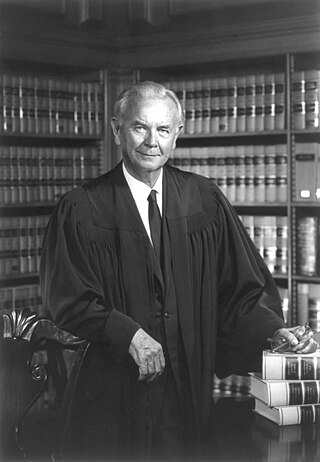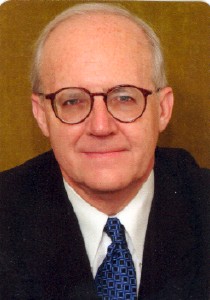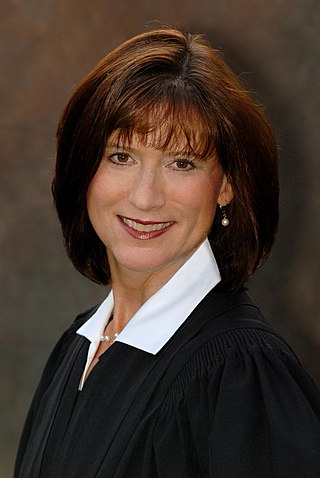Related Research Articles

Harry Andrew Blackmun was an American lawyer and jurist who served as an Associate Justice of the Supreme Court of the United States from 1970 to 1994. Appointed by Republican President Richard Nixon, Blackmun ultimately became one of the most liberal justices on the Court. He is best known as the author of the Court's opinion in Roe v. Wade.

William Joseph Brennan Jr. was an American lawyer and jurist who served as an Associate Justice of the Supreme Court of the United States from 1956 to 1990. He was the seventh-longest serving justice in Supreme Court history, and was known for being a leader of the Court's liberal wing.

Philip Pendleton Barbour was the tenth speaker of the United States House of Representatives and an associate justice of the Supreme Court of the United States. He is the only individual to serve in both positions. He was also a slave owner.

James Andrew Wynn is an American jurist. He serves as a United States circuit judge of the United States Court of Appeals for the Fourth Circuit and formerly served on both the North Carolina Court of Appeals and the North Carolina Supreme Court.
Atkins v. Virginia, 536 U.S. 304 (2002), is a case in which the Supreme Court of the United States ruled 6–3 that executing people with intellectual disabilities violates the Eighth Amendment's ban on cruel and unusual punishments, but states can define who has an intellectual disability. At the time Atkins was decided, just 18 of the 38 death penalty states exempted mentally retarded offenders from the death penalty.

James Harvie Wilkinson III is an American jurist who serves as a United States circuit judge on the United States Court of Appeals for the Fourth Circuit. His name has been raised at several junctures in the past as a possible nominee to the United States Supreme Court.

Martin v. Ziherl, 607 S.E.2d 367, was a decision by the Supreme Court of Virginia holding that the Virginia criminal law against fornication was unconstitutional. The court's decision followed the 2003 ruling of the U.S. Supreme Court in Lawrence v. Texas, which established the constitutionally-protected right of adults to engage in private, consensual sex.

The Supreme Court of Virginia is the highest court in the Commonwealth of Virginia. It primarily hears direct appeals in civil cases from the trial-level city and county circuit courts, as well as the criminal law, family law and administrative law cases that are initially appealed to the Court of Appeals of Virginia. It is one of the oldest continuously active judicial bodies in the United States. It was known as the Supreme Court of Appeals until 1970, when it was renamed the Supreme Court of Virginia because it has original as well as appellate jurisdiction.
In law, a per curiam decision is a ruling issued by an appellate court of multiple judges in which the decision rendered is made by the court acting collectively. In contrast to regular opinions, a per curiam does not list the individual judge responsible for authoring the decision, but minority concurring and dissenting opinions are signed.

The Connecticut Supreme Court, formerly known as the Connecticut Supreme Court of Errors, is the highest court in the U.S. state of Connecticut. It consists of a Chief Justice and six Associate Justices. The seven justices sit in Hartford, across the street from the Connecticut State Capitol. The court generally holds eight sessions of two to three weeks per year, with one session each September through November and January through May. Justices are appointed by the governor and then approved by the Connecticut General Assembly.

Danny Julian Boggs is an American attorney and a senior United States circuit judge of the United States Court of Appeals for the Sixth Circuit. He was appointed to the court in 1986 and served as its Chief judge from September 2003 to August 2009. Boggs was on the short list of President George W. Bush's candidates for the U.S. Supreme Court.

Diane Schwerm Sykes is an American jurist and lawyer who serves as the chief judge of the U.S. Court of Appeals for the Seventh Circuit. She served as a justice of the Wisconsin Supreme Court from 1999 to 2004.
A dissenting opinion is an opinion in a legal case in certain legal systems written by one or more judges expressing disagreement with the majority opinion of the court which gives rise to its judgment.

George Steven Agee is a United States circuit judge of the United States Court of Appeals for the Fourth Circuit and a former justice of the Supreme Court of Virginia.

Barbara Louise Milano Keenan is a senior United States circuit judge of United States Court of Appeals for the Fourth Circuit and a former justice on the Supreme Court of Virginia.
A judicial opinion is a form of legal opinion written by a judge or a judicial panel in the course of resolving a legal dispute, providing the decision reached to resolve the dispute, and usually indicating the facts which led to the dispute and an analysis of the law used to arrive at the decision.
Flemming L. Norcott Jr. is a former Associate Justice of the Connecticut Supreme Court. He was appointed to the Connecticut Superior Court in 1979 and remained there until his elevation to the Connecticut Appellate Court in 1987. He was appointed to the Connecticut Supreme Court in 1992. He also serves as Associate Fellow of Calhoun College at Yale University, as well as a lecturer. Justice Norcott received a Bachelor of Arts degree from Columbia University in 1965 and a Juris Doctor degree from Columbia Law School in 1968. He was born in New Haven, Connecticut.

Peter Vivian Daniel was an American jurist who served as an associate justice of the Supreme Court of the United States.
James L. Dennis is an American lawyer, jurist, and former politician serving as a senior United States circuit judge of the United States Court of Appeals for the Fifth Circuit, with chambers in New Orleans, Louisiana.
Roger Owen DeBruler was an American lawyer, politician, and judge who served as a justice of the Indiana Supreme Court from September 30, 1968 to August 8, 1996.
References
- ↑ "Lawrence L. Koontz, Jr., August 16, 1995-February 1, 2011; Senior Justice, 2011-present". Virginia Appellate Court History. 13 May 2014. Retrieved September 24, 2022.
- ↑ Vieth, Peter (July 22, 2016). "Senior Justice Koontz receives Carrico award". Virginia Lawyers Weekly. Retrieved September 24, 2022.
- ↑ Gangloff, Mike (December 4, 2010). "Judge puts gavel down after career of 43 years". Roanoke Times. Retrieved September 24, 2022.
- ↑ Porter v. Commonwealth, 276Va.203 (Va.2008).